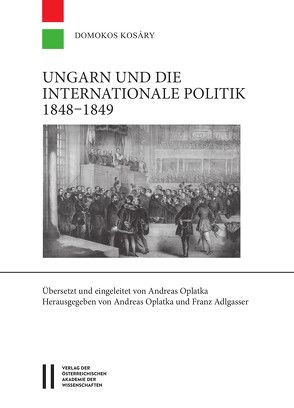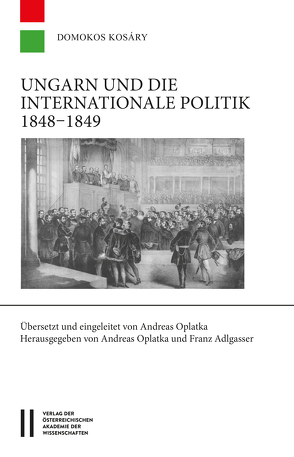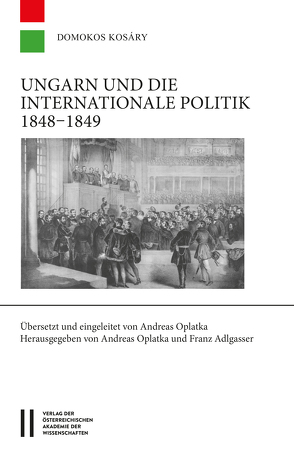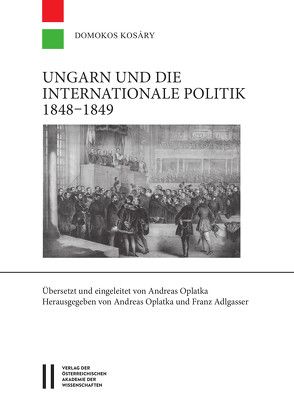
The late work of the great Hungarian historian Domokos Kosáry, Ungarn und die internationale Politik 1848–1849 [Hungary and International Politics in 1848–1849], deals with a much written-about subject. Yet no other historian has ever presented it in the way Kosáry does. The conflict between Austria and Hungary, leading to a war in the early autumn of 1848, is described by Kosáry in a general survey of European opinions and interests of that time, as they existed in London and Paris, St. Petersburg and Istanbul, Turin, Belgrade and Bucharest. He also describes the activities of exiled Eastern-Central-European personalities in great detail, especially those undertaken by the Polish prince Czartoryski. As a result, he shows that England, the leading European power at that time, did indeed feel a certain sympathy with the Hungarian war of independence but British foreign policy, shaped by Palmerston, consistently and sharply opposed Hungary’s secession. In London’s view, a strong Austrian Empire in the middle of the continent remained a strict necessity due to its function as a counterweight to Russia. The Hungarian government, born in the revolution of 1848, had overestimated its international elbow room. In addition, it complicated Hungary’s situation by a long-lasting, firm policy against the autonomy-ambitions of national minorities. True, the possibilities for the Hungarians were greatly restricted as the Austrian side never showed any readiness to negotiate with “rebels”. Kosáry’s conclusion, with regard to the past as well as the present and addressing Hungary (and all small countries), reads as follows: since the early 16th century, autonomous policies in Europe have only worked within borders created by changes in the European system. Only within the respective margin can damage be minimised or advantages perceived.
Aktualisiert: 2023-05-12
> findR *

The late work of the great Hungarian historian Domokos Kosáry, Ungarn und die internationale Politik 1848–1849 [Hungary and International Politics in 1848–1849], deals with a much written-about subject. Yet no other historian has ever presented it in the way Kosáry does. The conflict between Austria and Hungary, leading to a war in the early autumn of 1848, is described by Kosáry in a general survey of European opinions and interests of that time, as they existed in London and Paris, St. Petersburg and Istanbul, Turin, Belgrade and Bucharest. He also describes the activities of exiled Eastern-Central-European personalities in great detail, especially those undertaken by the Polish prince Czartoryski. As a result, he shows that England, the leading European power at that time, did indeed feel a certain sympathy with the Hungarian war of independence but British foreign policy, shaped by Palmerston, consistently and sharply opposed Hungary’s secession. In London’s view, a strong Austrian Empire in the middle of the continent remained a strict necessity due to its function as a counterweight to Russia. The Hungarian government, born in the revolution of 1848, had overestimated its international elbow room. In addition, it complicated Hungary’s situation by a long-lasting, firm policy against the autonomy-ambitions of national minorities. True, the possibilities for the Hungarians were greatly restricted as the Austrian side never showed any readiness to negotiate with “rebels”. Kosáry’s conclusion, with regard to the past as well as the present and addressing Hungary (and all small countries), reads as follows: since the early 16th century, autonomous policies in Europe have only worked within borders created by changes in the European system. Only within the respective margin can damage be minimised or advantages perceived.
Aktualisiert: 2023-05-12
> findR *

The late work of the great Hungarian historian Domokos Kosáry, Ungarn und die internationale Politik 1848–1849 [Hungary and International Politics in 1848–1849], deals with a much written-about subject. Yet no other historian has ever presented it in the way Kosáry does. The conflict between Austria and Hungary, leading to a war in the early autumn of 1848, is described by Kosáry in a general survey of European opinions and interests of that time, as they existed in London and Paris, St. Petersburg and Istanbul, Turin, Belgrade and Bucharest. He also describes the activities of exiled Eastern-Central-European personalities in great detail, especially those undertaken by the Polish prince Czartoryski. As a result, he shows that England, the leading European power at that time, did indeed feel a certain sympathy with the Hungarian war of independence but British foreign policy, shaped by Palmerston, consistently and sharply opposed Hungary’s secession. In London’s view, a strong Austrian Empire in the middle of the continent remained a strict necessity due to its function as a counterweight to Russia. The Hungarian government, born in the revolution of 1848, had overestimated its international elbow room. In addition, it complicated Hungary’s situation by a long-lasting, firm policy against the autonomy-ambitions of national minorities. True, the possibilities for the Hungarians were greatly restricted as the Austrian side never showed any readiness to negotiate with “rebels”. Kosáry’s conclusion, with regard to the past as well as the present and addressing Hungary (and all small countries), reads as follows: since the early 16th century, autonomous policies in Europe have only worked within borders created by changes in the European system. Only within the respective margin can damage be minimised or advantages perceived.
Aktualisiert: 2023-02-23
> findR *

The late work of the great Hungarian historian Domokos Kosáry, Ungarn und die internationale Politik 1848–1849 [Hungary and International Politics in 1848–1849], deals with a much written-about subject. Yet no other historian has ever presented it in the way Kosáry does. The conflict between Austria and Hungary, leading to a war in the early autumn of 1848, is described by Kosáry in a general survey of European opinions and interests of that time, as they existed in London and Paris, St. Petersburg and Istanbul, Turin, Belgrade and Bucharest. He also describes the activities of exiled Eastern-Central-European personalities in great detail, especially those undertaken by the Polish prince Czartoryski. As a result, he shows that England, the leading European power at that time, did indeed feel a certain sympathy with the Hungarian war of independence but British foreign policy, shaped by Palmerston, consistently and sharply opposed Hungary’s secession. In London’s view, a strong Austrian Empire in the middle of the continent remained a strict necessity due to its function as a counterweight to Russia. The Hungarian government, born in the revolution of 1848, had overestimated its international elbow room. In addition, it complicated Hungary’s situation by a long-lasting, firm policy against the autonomy-ambitions of national minorities. True, the possibilities for the Hungarians were greatly restricted as the Austrian side never showed any readiness to negotiate with “rebels”. Kosáry’s conclusion, with regard to the past as well as the present and addressing Hungary (and all small countries), reads as follows: since the early 16th century, autonomous policies in Europe have only worked within borders created by changes in the European system. Only within the respective margin can damage be minimised or advantages perceived.
Aktualisiert: 2023-02-23
> findR *
MEHR ANZEIGEN
Bücher zum Thema Kosáry
Sie suchen ein Buch über Kosáry? Bei Buch findr finden Sie eine große Auswahl Bücher zum
Thema Kosáry. Entdecken Sie neue Bücher oder Klassiker für Sie selbst oder zum Verschenken. Buch findr
hat zahlreiche Bücher zum Thema Kosáry im Sortiment. Nehmen Sie sich Zeit zum Stöbern und finden Sie das
passende Buch für Ihr Lesevergnügen. Stöbern Sie durch unser Angebot und finden Sie aus unserer großen Auswahl das
Buch, das Ihnen zusagt. Bei Buch findr finden Sie Romane, Ratgeber, wissenschaftliche und populärwissenschaftliche
Bücher uvm. Bestellen Sie Ihr Buch zum Thema Kosáry einfach online und lassen Sie es sich bequem nach
Hause schicken. Wir wünschen Ihnen schöne und entspannte Lesemomente mit Ihrem Buch.
Kosáry - Große Auswahl Bücher bei Buch findr
Bei uns finden Sie Bücher beliebter Autoren, Neuerscheinungen, Bestseller genauso wie alte Schätze. Bücher zum
Thema Kosáry, die Ihre Fantasie anregen und Bücher, die Sie weiterbilden und Ihnen wissenschaftliche
Fakten vermitteln. Ganz nach Ihrem Geschmack ist das passende Buch für Sie dabei. Finden Sie eine große Auswahl
Bücher verschiedenster Genres, Verlage, Autoren bei Buchfindr:
Sie haben viele Möglichkeiten bei Buch findr die passenden Bücher für Ihr Lesevergnügen zu entdecken. Nutzen Sie
unsere Suchfunktionen, um zu stöbern und für Sie interessante Bücher in den unterschiedlichen Genres und Kategorien
zu finden. Unter Kosáry und weitere Themen und Kategorien finden Sie schnell und einfach eine Auflistung
thematisch passender Bücher. Probieren Sie es aus, legen Sie jetzt los! Ihrem Lesevergnügen steht nichts im Wege.
Nutzen Sie die Vorteile Ihre Bücher online zu kaufen und bekommen Sie die bestellten Bücher schnell und bequem
zugestellt. Nehmen Sie sich die Zeit, online die Bücher Ihrer Wahl anzulesen, Buchempfehlungen und Rezensionen zu
studieren, Informationen zu Autoren zu lesen. Viel Spaß beim Lesen wünscht Ihnen das Team von Buchfindr.



